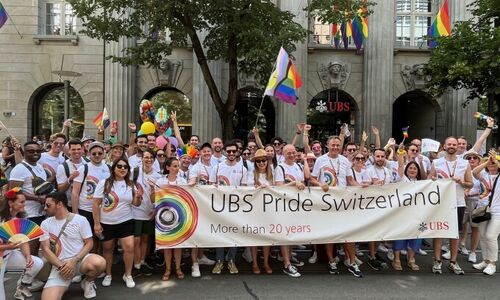Companies have an important role to play in raising awareness on LGBTQ+ issues, UBS’ global wealth management chief economist Paul Donovan told «Citywire» in an interview.
With increasingly more countries (Switzerland, the most recent) recognizing same-sex marriages, the LGBTQ+ community is experiencing a rise in social status. Although this is a good thing, it also means that the community is at risk of being targeted as a scapegoat in the current uncertain economic climate, UBS’ global wealth management chief economist Paul Donovan (pictured below) told «Citywire.»
In social-economic terms, one explanation for this is that a group of people, whose social status has fallen because of structural economic change, will blame a group whose status has risen, for their downfall, he said.
And companies have a role to play in making sure that doesn’t happen.

Question of Culture
With the majority of people employed by companies, the culture lived at work is often carried outside of the office shaping the way wider society thinks, Donovan said. Taking this into account, companies can’t be neutral on such topics, on the contrary, their LGBTQ+ inclusion efforts need to go beyond the «rainbow glitter in June,» he said.
Donovan referred to UBS' CEO Ralph Hamers' presence at Zurich’s pride march earlier this year as a prime example of corporate leadership as he walked with fellow employees, listening and learning from their experiences inside and outside of work.
The «S»
What’s more, there will be more focus from investors on inclusion and diversity as the «S,» the social component, in ESG moves centerstage. At the moment our understanding of the social issues within the financial industry is comparable to where sustainability was 15 years ago, according to Donovan.
Yet, he sees diversity and inclusion as key solutions to improving efficiency in terms of getting the right people with the right skills into the right jobs.
Outright exclusion of companies who operate in queer-hostile countries and jurisdictions, for example, is not necessarily the way to improve the lives of those affected. However, investors can consider whether companies have internal support or ally networks for the LGBTQ+ community in place, he said.
Coming Out
Visibility can be a problem when it comes to the data, however, as individuals are more likely to hide sexuality, which is deeply personal and fundamentally different from characteristics that one might share with members of one’s own family, such as religion, ethnicity or gender, he said.
This lack of visibility is reflected in the portion of top-level executives across all industries, who are openly queer, which is at 0.5 percent rather than at 10 percent which would be in line with the community’s representation in wider society, he said.
Despite this discrepancy, financial services, in particular, have made huge advances in advocating LGBTQ+ issues, Donovan said. A development, which has been aided by the quality of the industry's employees who are predominantly well educated, cosmopolitan and urban, he added.



































